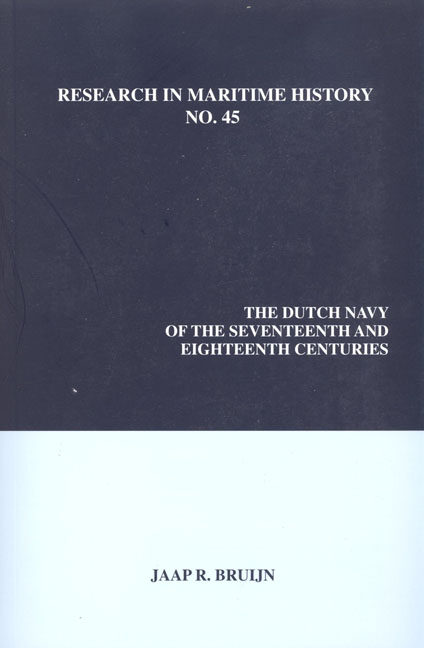Book contents
- Frontmatter
- Contents
- Illustrations
- Tables
- Series Editor's Foreword
- About the Author
- Introduction to the 2011 Edition
- Foreword
- Preface
- Introduction
- Map of the Dutch Republic
- Map of Dutch Naval Activity in European Waters
- Part One The “Old” Navy, Late 1500s-1652
- Part Two The “New” Navy, 1652-1713
- The “Old” Navy Out of Date
- John de Witt's New Navy
- An Era of Naval Campaigns against England and France and in the Baltic
- Changes in the Naval Administration
- De Ruyter and the Other Naval Officers
- Well-manned Ships
- Part Three A Second-Rate Navy, 1714-1795
- In Retrospect
- Bibliography
- Index
Changes in the Naval Administration
from Part Two - The “New” Navy, 1652-1713
- Frontmatter
- Contents
- Illustrations
- Tables
- Series Editor's Foreword
- About the Author
- Introduction to the 2011 Edition
- Foreword
- Preface
- Introduction
- Map of the Dutch Republic
- Map of Dutch Naval Activity in European Waters
- Part One The “Old” Navy, Late 1500s-1652
- Part Two The “New” Navy, 1652-1713
- The “Old” Navy Out of Date
- John de Witt's New Navy
- An Era of Naval Campaigns against England and France and in the Baltic
- Changes in the Naval Administration
- De Ruyter and the Other Naval Officers
- Well-manned Ships
- Part Three A Second-Rate Navy, 1714-1795
- In Retrospect
- Bibliography
- Index
Summary
In contrast with the period of the “old” navy in which the admiralties often operated on their own, more coordination of naval activities and the presence of a central figure in the naval administration were features of the second half of the seventeenth century. This was a logical consequence of the important role the Dutch had played in European politics and the existence of a strong, permanent Dutch fighting fleet. (The importance of Grand Pensionary John de Witt in this respect has already been discussed.) The greater coordination and centralization were unrelated to either the absence or the presence of a stadholder and admiral general. The Union of Utrecht of 1579 and the arrangement of the admiralties’ structure of 1597 were so vague and flexible that when the conditions of the time required it, one person could temporarily appropriate more power than was normally the case. Such was indeed the requirement during this period, but this person's success depended entirely on the tacit cooperation of the vast majority of the members of the States of Holland, including the city of Amsterdam. If Holland's interest in naval affairs should wane, the fate of any idea about coordination and centralization was sealed. John de Witt was able to rely upon sufficient support in this respect, and so was William III.
William III did not take a personal interest in naval affairs, however. For him, the navy was no more than an instrument in the struggle for the preservation of the Republic's territorial integrity in the war of 1672 and later in his conflicts with France. He never went to Texel or Zeeland to inspect naval preparations as De Witt regularly had done and, so far as is known, only once ever stepped aboard a ship of the Grand Fleet. On 12 August 1673, William addressed the council of war when De Ruyter's fleet was anchored off Scheveningen near The Hague. In November 1688, the fleet was for him personally no more than a means of transport to England, as were individual men-of-war in the following years. As a statesman, he fully realized the fleet's value and therefore not only gave great consideration to the navy as a whole but also continued to use De Witt's choice of secretary of the admiralty at Amsterdam, namely Job de Wildt.
- Type
- Chapter
- Information
- Publisher: Liverpool University PressPrint publication year: 2011



